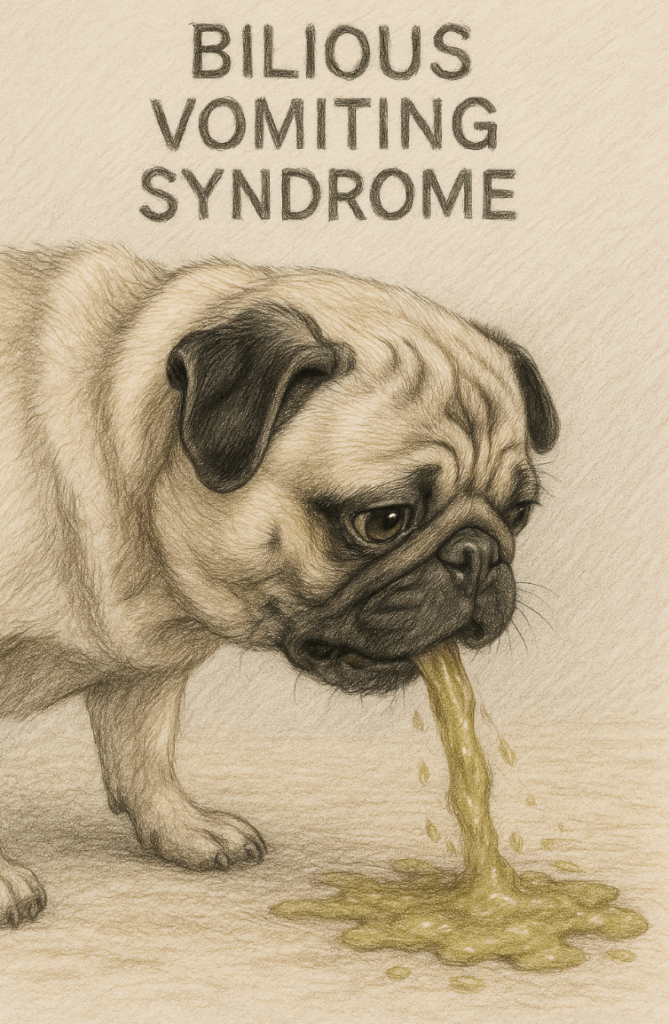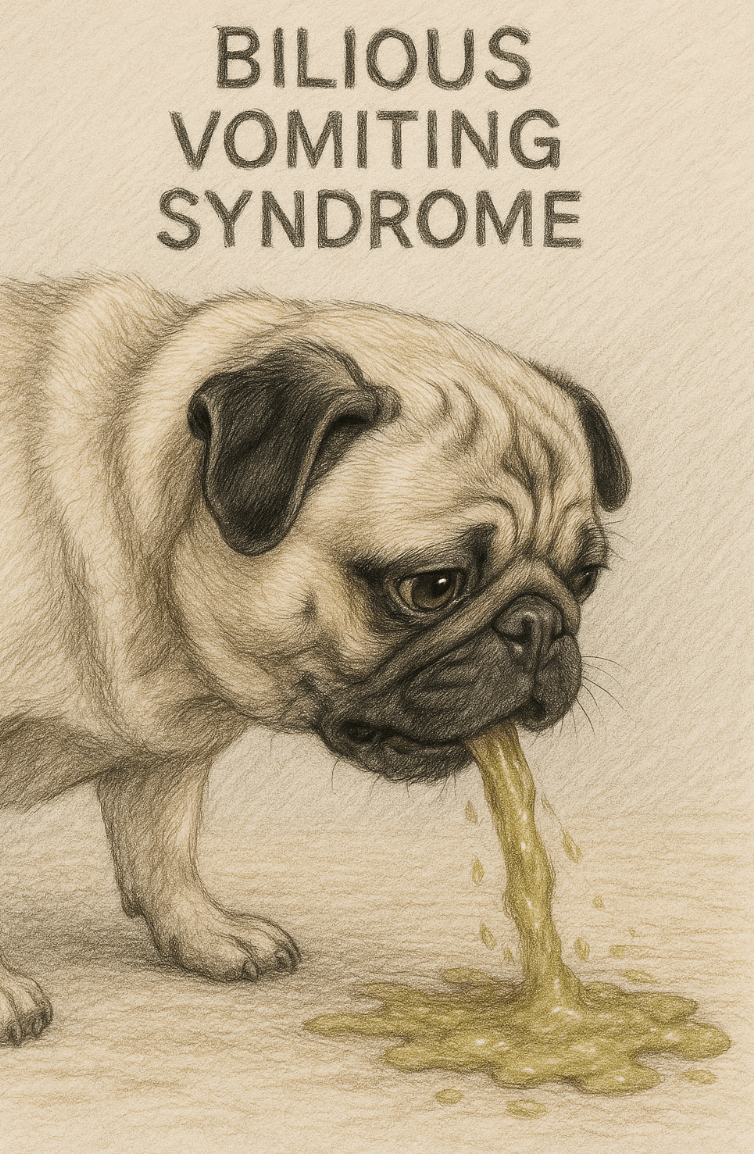Understanding Bilious Vomiting Syndrome in Dogs
Bilious vomiting syndrome (BVS) is a common yet often misunderstood condition that affects many dogs, particularly those with sensitive stomachs. This condition occurs when bile, a digestive fluid produced by the liver, irritates the stomach lining, leading to episodes of vomiting—often on an empty stomach. While bilious vomiting syndrome is not typically life-threatening, it can cause discomfort for your dog and concern for pet owners.
Recognizing the symptoms, understanding the causes, and implementing effective management strategies are essential steps in ensuring your furry friend’s well-being. In this blog post, we’ll explore everything you need to know about bilious vomiting syndrome, from prevention tips to treatment options, so you can help your dog feel their best.
Common Symptoms of Bilious Vomiting Syndrome
Identifying bilious vomiting syndrome early can make a significant difference in managing the condition effectively. Here are some key signs to watch for if you suspect your dog may be experiencing this issue.
Vomiting Yellow or Green Fluid:
The presence of bile, which is yellow or green in color, is a hallmark symptom of bilious vomiting syndrome.Morning Episodes:
Vomiting often occurs in the early morning or after long periods without food, as the stomach is empty and more susceptible to irritation.Lack of Appetite:
Some dogs may refuse to eat following a vomiting episode due to nausea or discomfort.Restlessness or Pacing:
Dogs may exhibit signs of unease or anxiety before vomiting, such as pacing or whining.Increased Salivation:
Excessive drooling can indicate nausea, which often precedes bilious vomiting.
If you notice these symptoms consistently, it’s important to consult your veterinarian to rule out other potential causes and confirm a diagnosis.
Potential Causes of Bilious Vomiting Syndrome
While the exact cause of bilious vomiting syndrome isn’t always clear, several factors can contribute to its development. Understanding these triggers can help you take preventive measures.
Prolonged Fasting:
Leaving the stomach empty for extended periods allows bile to accumulate and irritate the stomach lining.Dietary Sensitivities:
Certain foods or ingredients may exacerbate gastrointestinal issues, increasing the risk of bile-related vomiting.Stress or Anxiety:
Emotional stress can disrupt digestion and lead to increased bile production or stomach sensitivity.Underlying Health Conditions:
Issues like gastritis, pancreatitis, or liver disease may predispose dogs to bilious vomiting syndrome.Age and Breed Predisposition:
Older dogs or certain breeds with sensitive stomachs may be more prone to developing this condition.
Addressing these underlying factors can significantly reduce the frequency and severity of bilious vomiting episodes.
Check this guide 👉White Chunks in Dog Vomit: Best 7 Health Tips!
Check this guide 👉Is Dog Vomit Fungus Dangerous? Best 7 Health Tips!
Check this guide 👉Dog Vomiting Gallstones: Best 7 Expert Tips!

Preventive Measures for BVS | Treatment Options for BVS |
|---|---|
Feed smaller, frequent meals | Administer anti-nausea medications |
Avoid fasting for long periods | Provide bland diets during flare-ups |
Limit fatty or spicy foods | Use probiotics to support gut health |
Reduce stress through routine and exercise | Consult a vet for prescription treatments |
Monitor for dietary intolerances | Gradually reintroduce regular food |
How to Manage Bilious Vomiting Syndrome at Home
With proper care and attention, bilious vomiting syndrome can often be managed effectively at home. These tips will help you minimize episodes and keep your dog comfortable.
Adjust Feeding Schedule:
Offer small meals throughout the day, including a late-night snack, to prevent the stomach from remaining empty for too long.Provide Easily Digestible Food:
Opt for bland, low-fat foods like boiled chicken and rice to soothe the stomach during flare-ups.Hydrate Your Dog:
Ensure your dog stays hydrated, especially after vomiting, to prevent dehydration and aid recovery.Create a Stress-Free Environment:
Minimize stressors like loud noises or sudden changes in routine to promote better digestion.Monitor Progress:
Keep track of vomiting episodes and note any patterns or triggers to share with your veterinarian.
By implementing these strategies, you can help manage bilious vomiting syndrome and improve your dog’s quality of life.
When to Seek Veterinary Care for Bilious Vomiting Syndrome
While occasional vomiting may not be cause for alarm, certain signs indicate the need for professional veterinary intervention. Knowing when to seek help ensures your dog receives timely care.
Frequent or Persistent Vomiting:
If your dog vomits multiple times in a short period or experiences recurring episodes, it’s time to see a vet.Presence of Blood or Foreign Objects:
Vomit containing blood or non-food items signals a more serious issue requiring immediate attention.Signs of Pain or Distress:
Whining, lethargy, or abdominal tenderness may indicate an underlying condition like pancreatitis or an obstruction.Loss of Appetite or Weight Loss:
A sudden refusal to eat or noticeable weight loss can point to a deeper health problem.Dehydration Symptoms:
Dry gums, sunken eyes, or excessive panting suggest dehydration, which needs prompt treatment.
Seeking veterinary care promptly can prevent complications and ensure your dog receives the appropriate treatment.
Tips for Preventing Bile Build-Up in Dogs
Preventing bile accumulation in the stomach is key to reducing the frequency of bilious vomiting episodes. Here are some practical tips to help you achieve this.
Offer Overnight Snacks:
A small, easily digestible snack before bedtime can prevent the stomach from remaining empty overnight.Use Slow-Feed Bowls:
These bowls encourage slower eating, reducing the likelihood of gastrointestinal upset.Avoid Sudden Diet Changes:
Gradual transitions between foods help maintain digestive balance and prevent irritation.Incorporate Fiber-Rich Foods:
Adding fiber can regulate digestion and minimize bile reflux into the stomach.Maintain Regular Feeding Times:
Consistency in meal schedules helps establish a routine that supports optimal digestion.
By following these tips, you can proactively reduce the risk of bilious vomiting syndrome in your dog.
Supplements That May Help with Bilious Vomiting Syndrome
Certain supplements can support digestive health and alleviate symptoms associated with bilious vomiting syndrome. Consider these options under veterinary guidance.
Probiotics:
Probiotics restore beneficial gut bacteria, improving digestion and reducing nausea.Slippery Elm:
This natural remedy coats the stomach lining, providing relief from irritation caused by bile.Ginger Extract:
Known for its anti-nausea properties, ginger can help calm an upset stomach.Omega-3 Fatty Acids:
Found in fish oil, these reduce inflammation and support overall gastrointestinal health.Digestive Enzymes:
Supplementing enzymes aids in breaking down food, easing the digestive process.
These supplements can complement traditional treatments and enhance your dog’s comfort.
Lifestyle Adjustments to Support Dogs with BVS
Making lifestyle adjustments can play a crucial role in managing bilious vomiting syndrome and promoting your dog’s overall well-being.
Establish a Routine:
Consistent daily schedules for feeding, walking, and sleeping reduce stress and improve digestion.Encourage Gentle Exercise:
Light activities like short walks stimulate digestion without overexerting your dog.Limit Access to Trash or Non-Food Items:
Preventing ingestion of harmful substances avoids additional strain on the digestive system.Provide Mental Stimulation:
Puzzle toys and interactive games distract anxious dogs and reduce stress-related vomiting.Create a Calm Sleeping Area:
A quiet, comfortable space for rest minimizes nighttime anxiety and promotes better sleep.
These adjustments foster a supportive environment that helps your dog thrive despite bilious vomiting syndrome.
Frequently Asked Questions About Bilious Vomiting Syndrome
What is bilious vomiting syndrome?
It’s a condition where bile irritates the stomach lining, causing vomiting, often on an empty stomach.
Is bilious vomiting syndrome dangerous?
While not usually life-threatening, it can cause discomfort and may indicate underlying health issues.
Can diet changes help manage BVS?
Yes, feeding smaller, frequent meals and avoiding fatty foods can reduce episodes significantly.
How is bilious vomiting syndrome diagnosed?
Diagnosis involves ruling out other conditions through physical exams, blood tests, and sometimes imaging.
Are certain breeds more prone to BVS?
Breeds with sensitive stomachs, like Bulldogs or Boxers, may be more susceptible, but any dog can develop it.
Supporting Your Dog Through Bilious Vomiting Syndrome
Bilious vomiting syndrome can be challenging for both dogs and their owners, but with the right knowledge and approach, it’s entirely manageable. By adjusting feeding schedules, providing a balanced diet, and staying vigilant for warning signs, you can minimize episodes and ensure your dog remains happy and healthy. Remember, your veterinarian is your greatest ally in navigating this condition, so don’t hesitate to seek their advice whenever needed. With patience and care, you can help your furry companion overcome bilious vomiting syndrome and enjoy a vibrant, active life.
Canned Pumpkin for Cat Diarrhea: Best 7 Expert Tips! Natural remedy to firm stools, soothe upset bellies, and support gut health safely.
Can a Cat Give You Scabies? Best 7 Expert Tips! Discover the truth about feline mites, human skin risks, and how to protect yourself—without panic.
Cat Flea vs Human Flea: Best 7 Expert Tips! Discover the truth about bites, species, and how to eliminate infestations for good.
Weird Cat Behaviors: Best 7 Expert Tips! Discover why cats do strange things—and how to understand, not punish, their instincts for a happier home.





